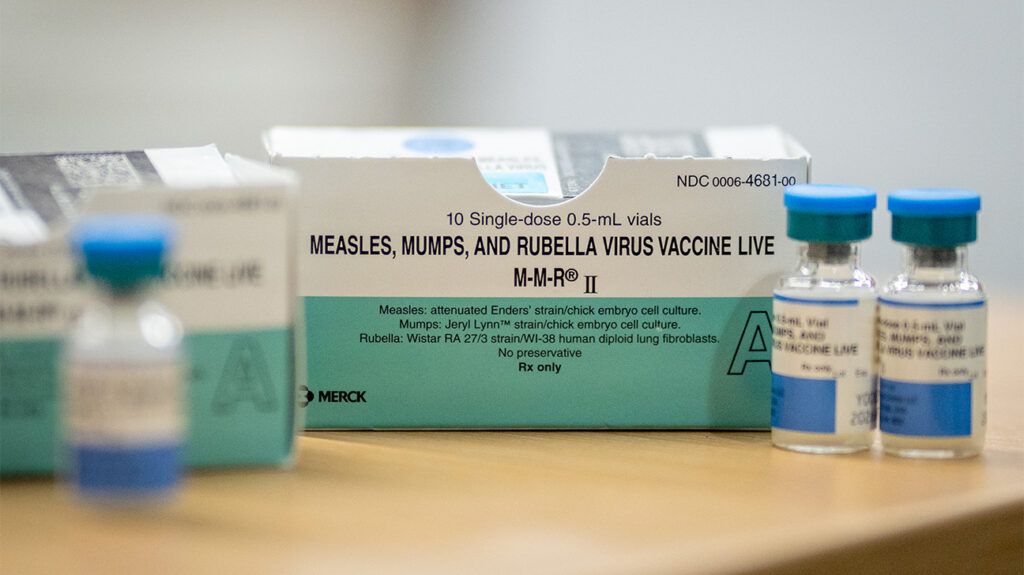
Image credit: Jan Sonnenmair/Getty Images
- Although measles is seen as a contagious viral disease that passes quickly, it can also cause damage that leaves long-term health effects.
- A measles infection can lead to a phenomenon called ‘immune amnesia,’ which affects the body’s ability to fight off other infections.
- It also may lead to neurological, respiratory, and fertility-related issues.
As the initial measles outbreak in Texas and New Mexico has grown and spread to
Measles is seen as relatively short-lived viral disease, although the acute symptoms can take around 7–18 days to show.
What’s more is that this highly contagious disease can also have significant long-term health consequences, namely neurological, respiratory, and immune system-related complications.
Medical News Today spoke to two experts — Monica Gandhi, MD, MPH, an infectious disease specialist with the University of California, San Francisco, and David Cutler, MD, board-certified family medicine physician at Providence Saint John’s Health Center in Santa Monica, CA — about complications related to a measles infection and how it impacts overall health.
The immune system takes a hit after a measles infection, leading to multiple changes in how the body’s defenses respond to other viral, bacterial, or fungal infections.
One change that can happen after a measles infection is a phenomenon called “immune amnesia.” As the name implies, it is essentially the immune system’s memory of how to fight previous pathogens being erased.
This effect may last up to a few years, long after the acute phase of the disease has passed and the person has recovered.
Cutler explained immune amnesia as:
“This refers to the process where the measles virus actually replaces the old memory cells of its host with new, measle virus-specific immune cells (lymphocytes). As a result, the patient emerges with both a strong measle virus-specific immunity and an increased vulnerability to all other pathogens. This makes the measles patient very vulnerable to other infections, especially other germs causing pneumonia.”
Gandhi also noted that “immune amnesia is when the measles virus can temporarily destroy immune cells (T and B cells) you have developed to other infections (or vaccines), making it more difficult for you to fight off a pathogen that you had previously seen.”
She added that “immune amnesia can lead to enhanced susceptibility to other infections up to 2–3 years after an active measles infection; the immune memory to other pathogens is eventually restored.”
Gandhi said that during the period of immune amnesia induced by a measles infections, people’s susceptibility to other infections heightens and this may increase their risk of mortality from other diseases.
Prior to measles vaccination becoming widespread, this infection resulted in
A measles infection can lead to many long-term neurological complications, most notably Subacute Sclerosing Panencephalitis (SSPE), which is a progressive neurological disorder.
The typical timeline for SSPE to develop is
Among the other neurological effects people experience after a measles infection are acute disseminated encephalomyelitis (ADEM), transverse myelitis, and Guillain-Barré syndrome. The disease can also cause persistent cognitive impairments.
When asked if she had experienced a young measles patient experiencing disease-related complications years later, Gandi shared:
“I have seen one such case in my career of a rare syndrome called subacute sclerosing panencephalitis (SSPE) that can occur years (7-10 years) after a measles infection. SSPE is a long-term complication of measles that, although rare (
4-11 SSPE cases/100,000 cases of measles ) is devastating. SSPE is a slowly progressive brain disorder characterized by cognitive decline, abnormalities in gait, vision loss and eventually a comatose state, progressing to death within a few years.”
Measles can also lead to long-term respiratory conditions such as bronchiectasis (permanent damage to airways), interstitial pneumonitis (inflammation of lung tissue inflammation that may lead to fibrosis), and increase one’s susceptibility to tuberculosis.
Some reports suggest that a measles infection may reactivate latent tuberculosis, leading to active disease in people who were previously infected.
“[B]ecause of the immune amnesia, dormant infections — like chronic herpes simplex virus or varicella zoster — can reactivate in the context of measles,” Gandhi warned.
A measles infection during pregnancy can increase a person’s risk of miscarriage, as well as lead to premature births. It has also been linked to lower birth weight and congenital defects. It can also cause complications such as pneumonia and encephalitis in the pregnant person.
Gandhi underscored that measles during pregnancy can be dangerous for the person carrying the baby to term.
“[Since they are] immunosuppressed from both the pregnancy and measles, [they may be] susceptible to pneumonia or encephalitis (more severe consequences of measles) during pregnancy. There is also a risk of miscarriage, preterm birth, or developmental problems in the baby,” she said.
“While measles (rubeola) has not been associated with birth defects to the extent that German measles (rubella) has, it can still be a serious infection during pregnancy,” Cutler said.
“So, preventing the spread of measles infection is important for everyone. And being fully vaccinated against measles is the best protection,” he added.
Cutler said what makes measles particularly dangerous to health lies in how infectious it is.
“
The only proven method of protection against measles is the MMR (measles, mumps, rubella) vaccine, which is administered in two doses. According to the CDC, this is approximately
It is also important to note that getting vaccinated also aids herd immunity, therefore protecting members of the community that may be more vulnerable to infections and complications due to age or medical conditions.
“[W]hile the most recent numbers may seem small, the very existence of measles cases is a great disappointment as this is a vaccine-preventable disease,” Cutler said.
